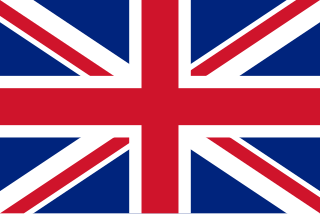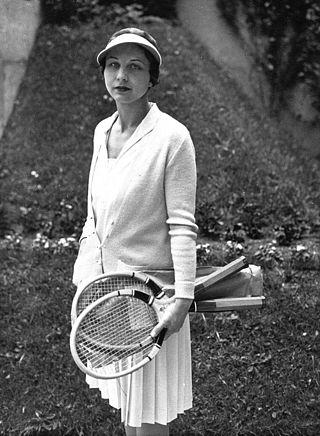
At the 1900 Summer Olympics, a polo tournament was contested. Matches were held on 28 May, 31 May, and 2 June. Five teams competed. Four of these teams were of mixed nationality, with British and French athletes competing on three teams. There was no playoff for third place.

Argentina at the 1924 Summer Olympics in Paris, France was the nation's fourth appearance out of seven editions of the Summer Olympic Games. Argentina sent to the 1924 Summer Olympics its first national team, under the auspices of the Argentine Olympic Committee, 77 athletes that competed in 39 events in 11 sports. They brought home Argentina's inaugural batch of Olympic medals, one gold in a team sport, three silver and two bronze; the latter five medals for individual achievement.

The United Kingdom of Great Britain and Ireland competed as Great Britain at the 1900 Summer Olympics in Paris, France. It was the second appearance of Britain after having participated in the inaugural 1896 Games. In Olympic competition, the nation has always shortened its official name to Great Britain rather than the United Kingdom seen elsewhere.

The modern Olympic Games were founded by French historian Pierre de Coubertin. France has competed in every edition, with the possible exception of the 1904 Games.

Water polo has been part of the Summer Olympics program since the second games, in 1900. A women's water polo tournament was introduced for the 2000 Summer Olympics. Hungary has been the most successful country in men's tournament, while the United States is the only team to win multiple times at the women's tournament since its introduction. Italy was the first to win both the men's and women's water polo tournaments.

France competed at the 1928 Summer Olympics in Amsterdam, Netherlands. 255 competitors, 219 men and 36 women, took part in 112 events in 17 sports. At the beginning of the games there was an incident where a French coach was physically assaulted by a Stadium gatekeeper who refused him entry. It boiled over to a point where the entire French team did not participate in the Parade of Nations, and conversations were made to pull out of the games completely. However, the issue was resolved and France went on to compete.

France was the host nation for the 1924 Summer Olympics in Paris. It was the second time that France had hosted the Games, after the 1900 Summer Olympics, also in Paris. 401 competitors, 373 men and 28 women, took part in 128 events in 20 sports.

Great Britain, represented by the British Olympic Association (BOA), competed at the 1920 Summer Olympics in Antwerp, Belgium. 234 competitors, 218 men and 16 women, took part in 84 events in 21 sports. British athletes won fourteen gold medals and 43 medals overall, finishing third. It would be the last Olympic Games in which Irish athletes participated for Great Britain, after foundation of Irish Free State in 1922.

Great Britain, represented by the British Olympic Association (BOA), competed at the 1924 Summer Olympics in Paris, France. This was the first Summer Olympics in which athletes from the newly independent Irish Free State competed separately. Following the Royal and Parliamentary Titles Act 1927, the name changed (officially) to 'United Kingdom of Great Britain and Northern Ireland' but the Olympic team competed as Great Britain from the 1928 games onwards. 267 competitors, 239 men and 28 women, took part in 115 events in 18 sports.

The United States competed at the 1924 Summer Olympics in Paris, France. 299 competitors, 275 men and 24 women, took part in 108 events in 18 sports.

Belgium competed at the 1924 Summer Olympics in Paris, France. 172 competitors, 166 men and 6 women, took part in 82 events in 17 sports.

The 1928 Summer Olympics Water Polo event was held between the fourth and eleventh of August. The final results of the tournament follow below.
Final results for the water polo tournament at the 1924 Summer Olympics. All medals were decided by using the Bergvall system.

Polo returned to the Olympic program at the 1920 Summer Olympics in Antwerp, after not being contested at the 1912 Games. Four teams competed. Great Britain repeated as Olympic champions. Spain took silver. The United States beat Belgium in the bronze medal match.

Polo returned to the Olympic program at the 1936 Summer Olympics in Berlin, after not being contested at the 1928 Games or 1932 Games. The 1936 tournament was the last time that the sport was contested at the Olympic Games. Argentina repeated as champions, winning gold medals in both of the Games in which the nation competed. Great Britain took silver; British polo players had earned medals in all five of the Olympic polo tournaments. Mexico took bronze, matching its previous performance in 1900.

The men's eight event was part of the rowing programme at the 1924 Summer Olympics. The competition, the sixth appearance of the event, was held from 13 to 17 July 1924 on the river Seine. Ten teams, each from a different nation, competed. The event was won by the United States, the nation's second consecutive and fourth overall victory in the event. Canada took silver, its first medal in the men's eight since 1908. Italy, making its debut in the event, took bronze.

The men's singles tennis competition was one of five tennis events at the 1924 Summer Olympics. There were 82 competitors from 27 nations. Nations were limited to four players each, as they had been in 1920. The event was won by Vincent Richards of the United States, the nation's first victory in the event since 1904 and second overall. France and Italy each earned their first men's singles tennis medals, with Henri Cochet's silver and Uberto De Morpurgo's bronze, respectively.

The women's singles tennis competition was one of five tennis events at the 1924 Summer Olympics. It was held from 13 to 20 July at the Stade Olympique Yves-du-Manoir. There were 31 competitors from 14 nations. The event was won by Helen Wills of the United States, the first American victory in the women's singles. Julie Vlasto of France took silver. Kathleen McKane Godfree of Great Britain repeated as bronze medalist.

Defending gold medalist Andy Murray of Great Britain successfully retained his title, defeating Juan Martín del Potro of Argentina in the final, 7–5, 4–6, 6–2, 7–5 to win the gold medal in Men's singles tennis at the 2016 Summer Olympics. He became the first tennis player ever, male or female, to win two Olympic singles gold medals. Murray and del Potro were only the third and fourth men to win multiple singles medals of any color. Murray's gold was Great Britain's fifth in men's singles, the most of any nation. In the bronze medal match, Japan's Kei Nishikori defeated Spain's Rafael Nadal, 6–2, 6–7(1–7), 6–3, earning Japan's first men's singles Olympic medal since 1920.














